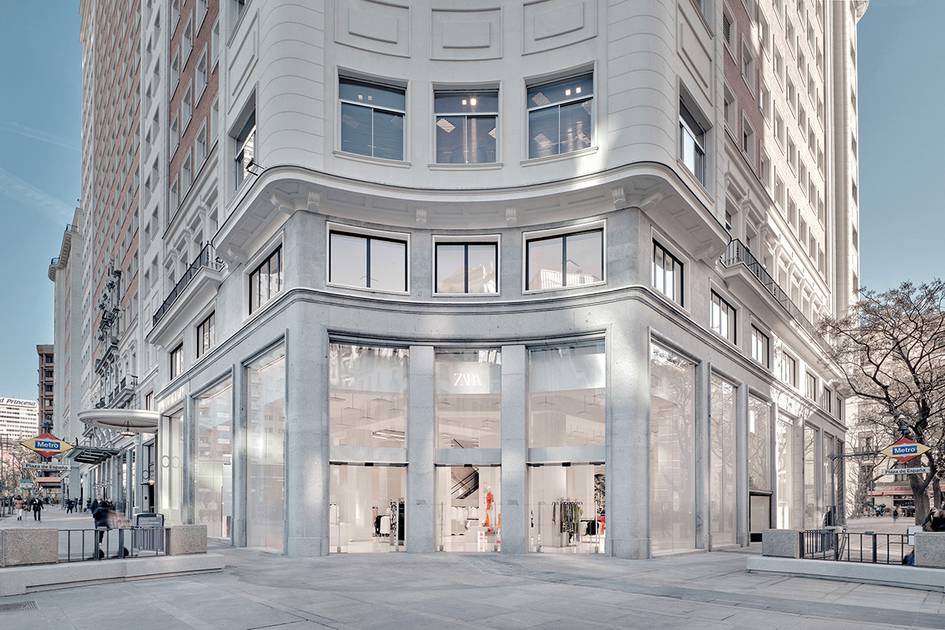From its position as the parent company of Zara, Zara Home, Massimo Dutti, Oysho, Lefties, Pull&Bear, Stradivarius, and Bershka, the Spanish giant Inditex continues to set the pace with its capacity for innovation and strategic expansion. FashionUnited analyses the key milestones, challenges, and movements that defined 2024 for the group, revealing how it has consolidated its position in such a dynamic and competitive market.
Financial performance and business expansion
Inditex has concluded 2024 with outstanding financial performance, achieving sales of 35.9 billion euros and a +30 percent increase in profits, thanks to margin optimisation and cost control. However, its annual growth has decelerated to 7 percent, marking the lowest rates of the financial year, influenced by the loss of weight in key markets like the Americas and Asia, and a slower performance from Zara, its flagship chain.
Despite this slowdown, Inditex has been a key pillar of the financial market. Its performance has propelled the IBEX 35 to record highs since 2010, consolidating investor confidence in its business model. This balance between moderate expansion and sustained profitability reaffirms the company’s ability to adapt to the changing dynamics of the global market, maintaining its leadership in the fashion industry despite the economic challenges of the last quarter.
International expansion and new initiatives
On the international front, 2024 has been a year of strategic moves for Inditex. The company has resumed operations in markets such as Venezuela and Ukraine, marking its return to countries where it had paused its activity. Furthermore, it has expanded its presence in Peru, introducing Stradivarius, Oysho, and Massimo Dutti to this South American market for the first time.
In China, Inditex has consolidated its position by partnering with JD.com to strengthen the marketing of Massimo Dutti in the digital market. Concurrently, Inditex reinforced its commitment to the US, joining AAFA, the leading fashion trade association in the country, underscoring its commitment to one of the most competitive and globally significant markets.
These initiatives not only consolidate Inditex’s presence in key markets but also demonstrate its ability to adapt to the cultural and economic particularities of each region.
Innovation and sustainability: The partnership of the future
One of the biggest challenges for Inditex in 2024 has been balancing its growth with its environmental commitment. The company has invested in pioneering companies like Infinited Fiber, specialising in circular fibres, and Epoch Biodesign, a biorecycling start-up that seeks to transform plastic waste into useful resources.
In addition, it has consolidated its partnership with Poveda Textil to develop innovative fabrics from recycled polyester.
In the energy sector, the group is making progress in the construction of a wind farm at the outer port of A Coruña, reinforcing its decarbonisation strategy.
These initiatives reflect the challenge facing fashion companies when it comes to continuing to grow while reducing their environmental impact.
Labour relations and disputes: Tensions and agreements
The labour arena has been one of the most complex areas for Inditex this year. Although the renewal of the incentive of up to 1,000 euros for its shop assistants was well received, this did not prevent an escalation of protests led by trade unions, with demonstrations in A Coruña and a strike at the Arteixo headquarters.
In response, Inditex convened a national negotiating table to improve the working conditions of its employees, reaching agreements such as a salary increase of +16 percent in Plataforma Europa. These initiatives reflect the company’s efforts to balance labour demands with its operational consolidation strategy.
Zara and the transformation of retail
Zara, Inditex’s flagship brand par excellence, has been at the forefront of some of the most innovative initiatives of the year. The brand launched Zara Hair, its first line of hair care products, expanding its reach into the lifestyle sector.
In Madrid, it premiered a new store concept that includes the world’s first Zacaffe and an exclusive collaboration with Castellano, reinforcing the connection between fashion and customer experience.
Furthermore, Zara introduced Zara Streaming, an innovative platform that combines global reach, cross-functionality, and digital experiences, taking fashion interaction to a new level with live online shopping, or bringing Madrid to a standstill from the Cuatro Torres Business Area to the Matadero Madrid cultural centre to promote its Athleticz line with a race that saw over 10,000 race bibs sold, are a perfect example of how brands can connect with the modern consumer.
This article originally appeared on FashionUnited.ES. It was translated to English using an AI tool called Genesis and edited by Rachel Douglass..
FashionUnited uses AI language tools to speed up translating (news) articles and proofread the translations to improve the end result. This saves our human journalists time they can spend doing research and writing original articles. Articles translated with the help of AI are checked and edited by a human desk editor prior to going online. If you have questions or comments about this process email us at [email protected]







